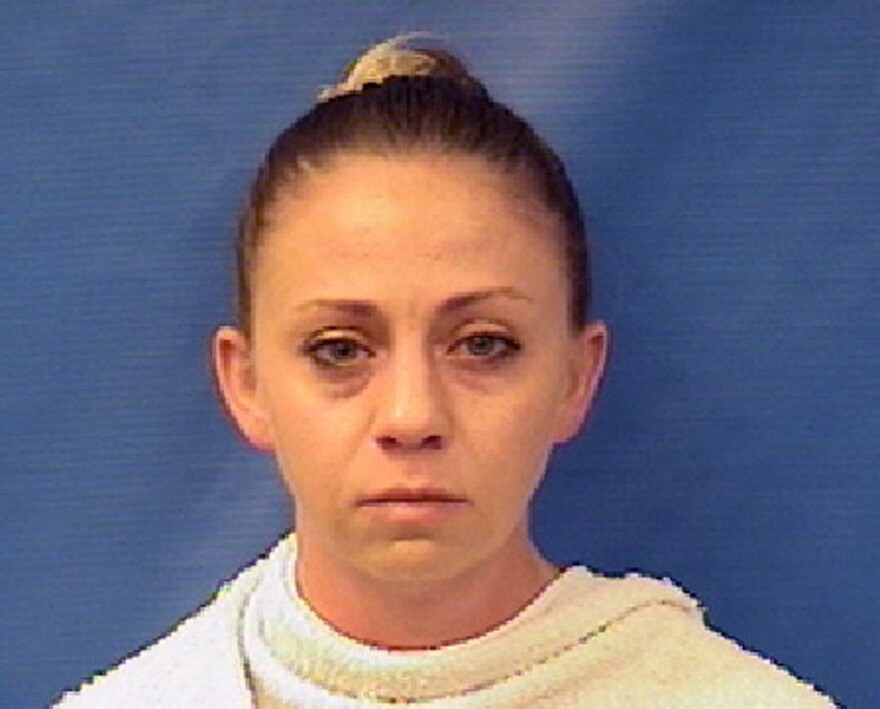When Officer Amber Guyger fatally shot Botham Jean in his apartment, she was off duty, coming home after working a long shift. But was she acting as a Dallas police officer when she pulled the trigger? Lawyers say she might have been, and that could have big legal implications.
Nearly a month after the shooting, there’s still a lot about that night that we don’t know — details of exactly what happened between Amber Guyger and Botham Jean. But there are some that came out early and have been widely noted: Guyger was still in her uniform when she shot Jean in his apartment and she used her service weapon.
“It’s our position that she was operating under color of state authority. When people saw her in the public, they believed they were looking at a police officer. And that’s critically important,” said Lee Merritt, a lawyer for the family of Botham Jean, at a press conference.
Last week, the Jean family announced plans to bring a federal lawsuit against both Guyger and the city of Dallas, her employer at the time. She was fired from the Dallas Police Department two days before the lawsuit was announced. Guyger’s attorney hasn’t commented on the potential lawsuit, and he’s called the killing a tragic mistake.
Merritt, the Jean family's attorney, did not respond to a request for comment on this story. But legal experts say the way he’s talked about the shooting may signal the frame of the lawsuit.
“That use [of] the phrase ‘color of state authority’ is the language of a very important federal civil rights statute 42 USC Section 1983,” said Jennifer Laurin, who teaches civil rights law at the University of Texas law school in Austin.
Section 1983 is the part of federal law that allows people to sue state or local officials for violating their constitutional rights.
The first step in bringing a lawsuit like this, she says is to demonstrate “that in the course of undertaking the conduct that allegedly caused the violation of rights, that they were acting under color of law — that they were using their state authority in some way,” Laurin said.
A fuzzy line between off-duty and on
Laurin says there are a number of factors that a court would look to determine whether Guyger was acting as a police officer when she shot Botham Jean, not just a regular person, including some that may not be publicly known yet.
The fact that Guyger was off duty, she says, may not be the determining factor, because the line between on- and off-duty actions can be blurry.
“A police officer, even though officially off duty — clocked out — might still be using their official power or using the trappings of their office or using the authority that their position gives them to undertake the actions that are complained of,” she said.
There are a number of cases in which off-duty officers have been considered to be acting in their official capacity as officers. And there are a lot of instances that it’s expected, like when an off-duty officer sees crime happening in front of them. But it’s not always cut and dry, Laurin says, and may not be in Guyger’s case, depending on what other facts have emerged in the investigation.
“The use of a service weapon is relevant. The wearing of a uniform is relevant. The kinds of things that were said are relevant. But none of these things are dispositive,” she said.
If Jean family lawyer Lee Merritt can establish that Guyger was acting as a cop when she shot Jean, then he has established the grounds to argue that she, as a government agent, deprived Jean of his constitutional rights.
But Merritt says the city of Dallas is also responsible.
A high bar to prove liability
That might be a more difficult prospect, connecting Guyger’s actions to the policies of her employer, the city, for the purposes of winning civil damages, according to Art Brender, a lawyer in Fort Worth who has tried police misconduct cases.
“To hold her employer, the city, responsible under [federal law Section] 1983, you have to show that there was a custom or policy of unconstitutional actions, and that that policy directly caused his death,” Brender said.
Brender says the Jean family’s legal team might look at Guyger’s own record of discipline and use of force, as well as how officers in the department are trained to use force, and how they’re disciplined if they use too much. To prove the city of Dallas had some responsibility for the death of Botham Jean, the lawyers would have to point to some policy or practice within the police department that itself is unconstitutional, which Guyger was following and that could have led to Jean’s death.
“The only way Dallas would be responsible is if Dallas itself somehow was responsible for her actions independently of what she did,” Brender said.
It’s a high bar, and Brender says these federal civil rights cases can drag on for years. The city of Dallas declined to comment for this story.





